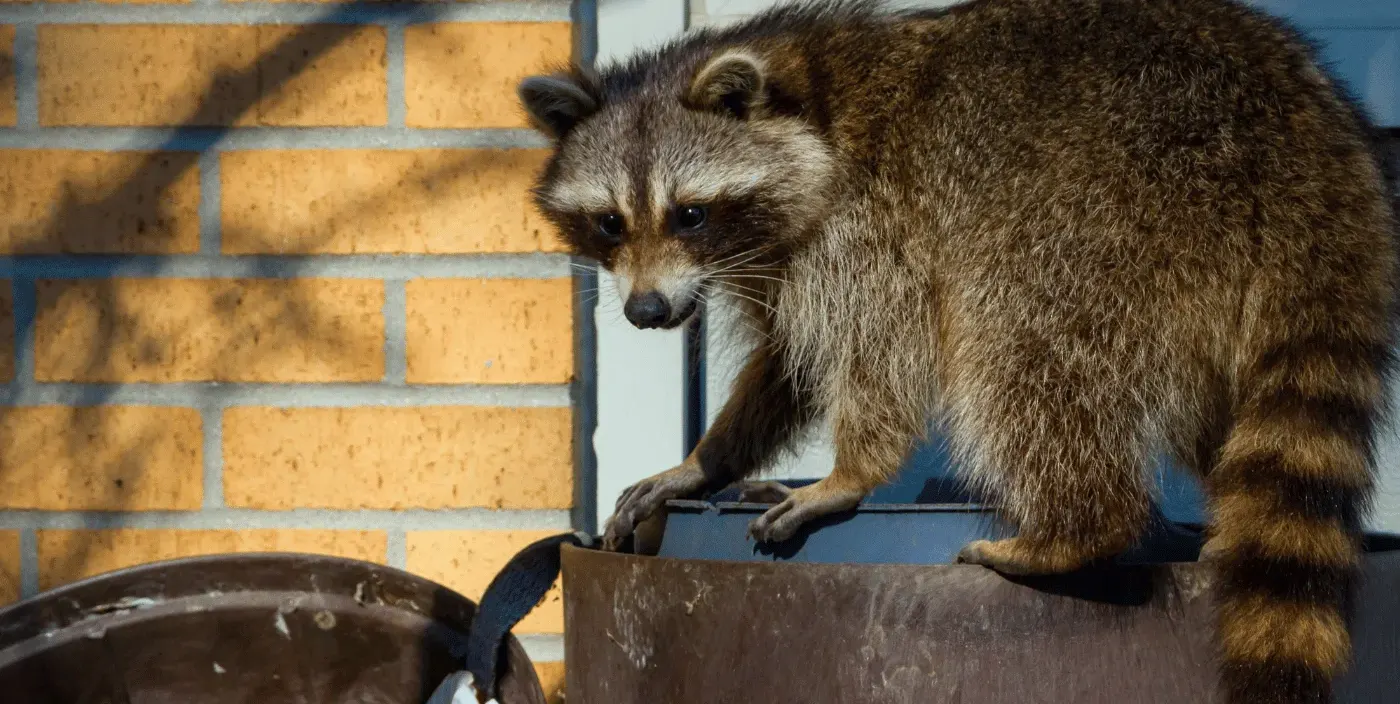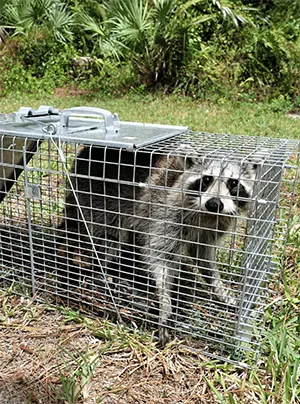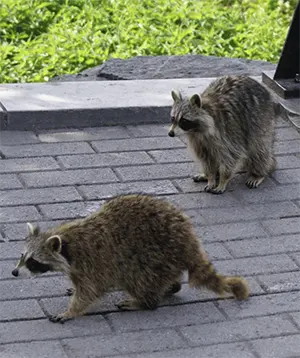So you have a recurring raccoon problem? You are not alone. The trouble with most raccoon removal is the practice of trapping and releasing the animal within one kilometer of your home and that the animal will almost certainly return. In this article, we'll look at some habitat modifications you can make to help deter raccoons from making your home theirs, as well as how to get rid of raccoons once and for all.

Raccoons are highly intelligent creatures and excel at adapting to changing circumstances and environments. That is why they are not only surviving, but actually thriving in urban centres such as Toronto, Mississauga, and Brampton. They also know a good thing when they see it; urban living makes for plenty of food with minimal effort in addition to some pretty posh spaces to make a home.
How Do You Get Rid of Raccoons?
Well, the general recommendations and practices all cite the following 3 methods:
- Trap and release within one kilometer of capture
- Minor habitat modification
- Exclusion to prevent entry into homes
While all of them have merit and will yield some positive results, none of them manage to address or solve the problem completely. Let's look at this in more detail:
Trap and Release Raccoons
 Live trapping a raccoon is really the only option you have as a home owner. MNR's Wildlife Regulations state that you must release the captured animal within a 1 kilometer radius of where it was caught. The main reasons for this are prevention of the spread of diseases and that animals transported farther away may end up attacked and/or starve due to having lost their territory. Trapping can also be tricky because most laymen aren't able to recognize a lactating female - potentially trapping a mum with babies left behind. This is something you'll want to avoid under any and all circumstances. Raccoon kits will be doomed to suffer a horrible death without the care of their mother. The other reason is to prevent the spread of disease.
Live trapping a raccoon is really the only option you have as a home owner. MNR's Wildlife Regulations state that you must release the captured animal within a 1 kilometer radius of where it was caught. The main reasons for this are prevention of the spread of diseases and that animals transported farther away may end up attacked and/or starve due to having lost their territory. Trapping can also be tricky because most laymen aren't able to recognize a lactating female - potentially trapping a mum with babies left behind. This is something you'll want to avoid under any and all circumstances. Raccoon kits will be doomed to suffer a horrible death without the care of their mother. The other reason is to prevent the spread of disease.
Remember how raccoons are very smart and crafty? Yeah, no self respecting raccoon will be caught more than twice - and now you're dealing with a trap shy animal.
But, let's say you did trap a raccoon.. there's no danger of babies, the animal appears healthy and you are driving off 1/2 kilometer or so and release the little bugger. Well done. But darnit, you could swear you're seeing the same bandit rummaging around your trash bin 3 days later. Yep, probably. He has a fine sense of direction and THIS is his home. Your home. Now what? We'll come back to this.
Habitat Modification
This is fairly simple and inexpensive; it includes adjusting your habits as well as those of the raccoon. Some minor changes may include:
- Removing all outdoor pet food or water bowls
- Emptying bird baths at night
- Securing trash and compost bins (store indoors, if possible)
- Trim tree branches close to the house and roof
- Trim shrubs and bushes around the bottom, thus removing protective cover
- General yard cleanup - remove fallen fruit from your fruit trees, etc.
Raccoon Exclusion
Next up are exclusion methods. This includes anything from general maintenance, roof inspection, closing up of any openings or cracks, installing chimney caps to erecting a fence around your vegetable garden, and much more. When closing up any openings, use heavy duty wire mesh and make sure everything is flush. Raccoons display an extraordinary amount of dedication when it comes to gaining access to your home, are incredibly good with their 'hands', and surprisingly strong. Something we have found quite worth while is Electrical Shock Track along fences and/or roof lines. This can be hooked up to a solar unit and is strong enough to jar and frighten a raccoon, but not enough to hurt him.
The Law: Why Release within 1km?
 That is a good question. If we know that raccoons will likely return if we release them close by, why do it? According to Ontario's MNR (Ministry of Natural Resources) there are three main reasons for the 1km rule:
That is a good question. If we know that raccoons will likely return if we release them close by, why do it? According to Ontario's MNR (Ministry of Natural Resources) there are three main reasons for the 1km rule:
Prevent the spread of diseases
With raccoons being the most common carrier of Rabies, and with this being a disease with fatal outcome if transmitted to humans, that makes sense. We would not want to move an infected animal and risk spreading the virus.
Ensure wildlife is treated humanely
No matter what, any living creature deserves to be treated humanely. We all should make reasonable effort to prevent any animal from suffering needlessly. While Mother Nature surely didn't intend for raccoons to be living out of our trash cans, we (humans) keep taking over their original habitats and displacing them into our backyards - so, we really can't blame wildlife for making do with what they've got.
Prevent wildlife from being relocated outside their home ranges
Ok. Why? What happens if a raccoon finds himself outside of his home range? If a raccoon has been an urban dweller all its life, it's quite possible that it wouldn't be able to function adequately when suddenly dumped into 'the wild'. The animal would be confused, disoriented, and certainly stressed. Their usual radius of about three city blocks contained their den sites and known food sources - none of that is available in their new location. In such a situation, raccoons typically do not survive more than a few months. Stress, lack of food, and possibly violent confrontation with already established raccoons will take their toll.
Alright. Back to the original question then:
How Do You Get Rid of Raccoons for good?
There is only one way to ensure the animal cannot return: Euthanize. This option is lawful and available to home owners in Ontario. It is, of course, a controversial and troublesome subject. But it is the only permanent solution to raccoons destroying your home. And, one thing to consider: Once raccoons have taken up residence in your attic, they will return. They will rip up whatever is in their way, even if you've spent considerable time and money to fix whatever access point allowed them to enter in the first place.
We may outline the process of euthanizing a wild animal in another article if you are interested in learning more. For now, let's conclude:
How Do You Remove Raccoons Permanently?
Call Hawkeye if you're experiencing raccoon problems in the General Toronto Area and are looking for Permanent Raccoon Removal. Hawkeye Bird & Animal Control is licensed and authorized to humanely euthanize captured raccoons - if you ask for it.
Related Articles: https://www.hawkeye.ca/blog/raccoon-related-challenges-in-bramptons-residential-areas















